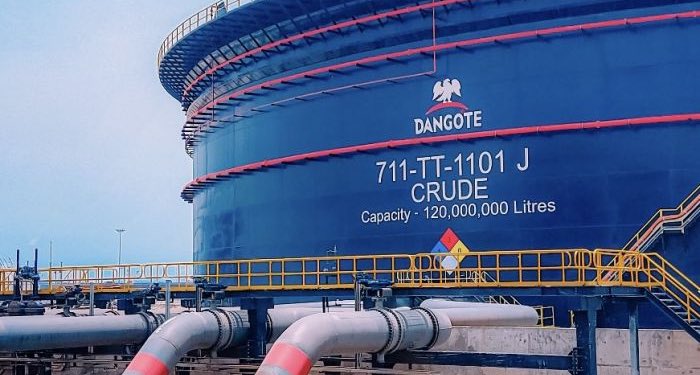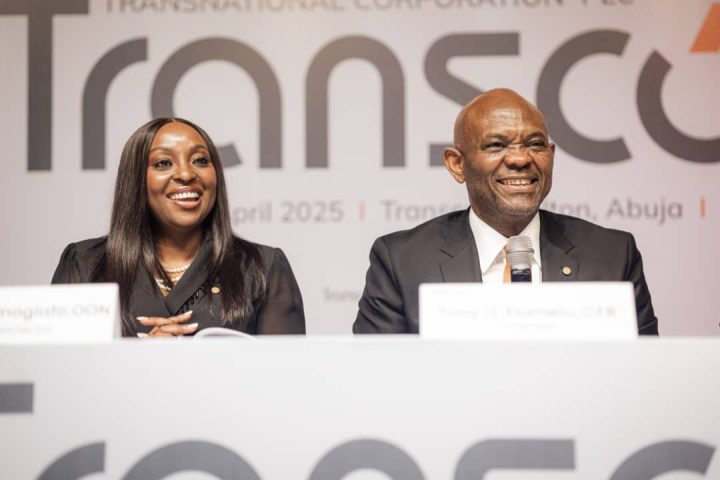The Dangote Petroleum Refinery recently received four cargoes of crude oil from the Nigerian National Petroleum Company Limited (NNPCL), marking the start of the much-anticipated naira-for-crude sale agreement. This development, confirmed by both the refinery and government officials, signals a new approach to oil refining in Nigeria, aimed at boosting local production while reducing dependency on imports. However, questions about pricing, supply, and the long-term viability of this agreement persist.
The Naira-for-Crude Agreement: A Step Towards Energy Independence
Under the naira-for-crude deal, the Nigerian government has committed to supplying crude oil to local refineries, including the Dangote refinery, in exchange for payment in naira. This is part of a broader strategy to ease pressure on the country’s foreign exchange reserves while addressing the frequent fuel shortages that have plagued Nigeria for years.
Join our WhatsApp ChannelAn official from the Dangote refinery, speaking under anonymity, confirmed the arrival of the four cargoes, stating, “The naira-for-crude deal has started. The Dangote refinery has received four cargoes so far, and we are still expecting more. The government may decide to renew the agreement after the initial six months, but we’ll have to wait and see.”
This new arrangement is being closely watched by many stakeholders, as it could significantly alter the dynamics of Nigeria’s oil industry. With a refining capacity of 650,000 barrels per day, the Dangote refinery is positioned to play a crucial role in meeting the country’s energy needs. However, the refinery faced challenges in securing crude oil, with allegations of international oil companies (IOCs) prioritizing sales to foreign markets over local refineries.
Supply and Pricing Challenges
Despite the optimism surrounding the naira-for-crude deal, challenges persist. The President of the Dangote Group, Aliko Dangote, previously raised concerns about IOCs deliberately obstructing crude oil supply to his refinery. He alleged that IOCs were insisting on selling crude through foreign intermediaries, thus driving up costs for local refineries. “The local price of crude will continue to increase because the trading arms are offering cargoes at a $2 to $4 per barrel premium above the official price,” Dangote lamented.
This issue was further elaborated on by Devakumar Edwin, Vice President of Oil & Gas at Dangote Industries Limited, who emphasised the impact of these premiums on the refinery’s operations. “When cargoes were offered to us by the trading arms, it was sometimes at a $2 to $4 premium above the official price set by the Nigerian Upstream Petroleum Regulatory Commission (NUPRC),” Edwin explained.
The question of pricing is critical. For Nigeria’s energy sector to truly benefit from local refining, the cost of crude needs to be competitive. While the naira-for-crude agreement aims to stabilize prices and improve supply, market factors, including the exchange rate and global oil prices, will still play a significant role in determining the final cost of refined products.
READ ALSO: Naira-for-Crude Deal Boosts As Dang0te Refinery Gets First Supply From NNPCL
A New Dawn for Local Refining?
With the first phase of the naira-for-crude deal underway, many are hopeful that this could be the beginning of a new era for Nigeria’s refining industry. The refinery is expected to begin selling refined petroleum products such as Premium Motor Spirit (PMS), diesel, and aviation fuel to local marketers, all priced in naira.
Chinedu Ukadike, National Publicity Secretary of the Independent Petroleum Marketers Association of Nigeria (IPMAN), expressed optimism about the deal, saying, “It is a very good gesture to allow Dangote to get enough crude to refine petroleum products for us. We are aware that the NNPC had complained about the shortfall in PMS supply, but now that they have supplied four cargoes to Dangote, we expect the supply of PMS and other products to stabilize.”
Indeed, the arrival of the four cargoes has already begun to impact the market. According to S&P Global Commodities, shipments of imported petrol into Nigeria have dropped sharply since the beginning of October. This suggests that local production, led by the Dangote refinery, could soon reduce Nigeria’s dependence on fuel imports, a key objective of the naira-for-crude agreement.
Potential for Expansion and Future Challenges
While the initial results of the naira-for-crude agreement are promising, there are still many unknowns. The refinery is reportedly ramping up production, with a target of supplying 30 million litres of PMS per day. However, experts warn that the refinery could face disruptions due to its large single-train design, which makes it vulnerable to operational setbacks.
A faster-than-expected ramp-up in production could also put pressure on global gasoline markets. S&P Global reports that the Dangote refinery could displace up to 260,000 barrels per day of gasoline imports from Europe by 2026, a significant shift in the West African oil market.
However, there is also resistance from oil producers. The Independent Petroleum Producers Group (IPPG), representing local oil companies, has warned against being forced to sell crude to local refineries under the naira-for-crude agreement. They argue that such an arrangement could interfere with the free market, where prices are determined by the highest bidder.
In a letter to the NUPRC, the Chairman of IPPG, Abdulrazak Isa, stressed the need for a balanced approach. “Any national production above the allocated volume for local refineries should be treated strictly as export volumes, adhering to the willing-buyer, willing-seller framework of the international market,” Isa wrote.
A Gamble That Could Pay Off
The naira-for-crude agreement is a bold move by the Nigerian government to revitalize the country’s oil refining capacity and reduce its dependence on imported fuel. If successful, it could mark the beginning of a new era for Nigeria’s energy sector, with the Dangote refinery at its centre.
However, much will depend on the continued supply of crude, competitive pricing, and the ability of the refinery to ramp up production without significant disruptions. As Chinedu Ukadike noted, “Let us allow the factor of demand and supply to determine the price. There will be a time when prices will start descending instead of going up.”
For now, the naira-for-crude agreement offers a glimmer of hope for Nigeria’s long-struggling oil sector, but it remains a gamble with many variables still in play.
Emmanuel Ochayi is a journalist. He is a graduate of the University of Lagos, School of first choice and the nations pride. Emmanuel is keen on exploring writing angles in different areas, including Business, climate change, politics, Education, and others.



















Follow Us